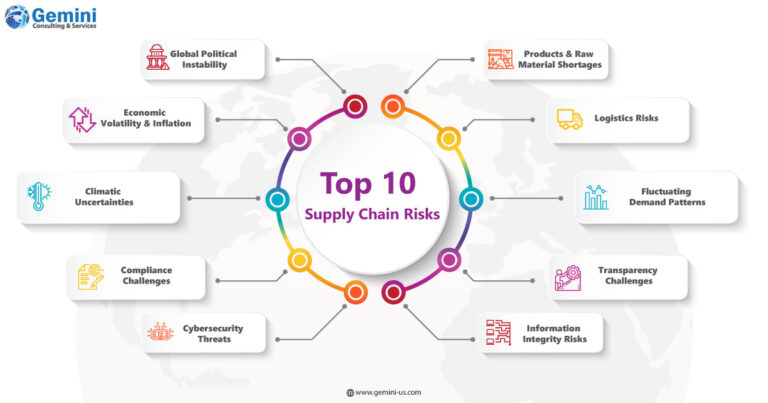Today, supply chain risk has become one of the biggest business challenges. For many businesses, it was the COVID-19 pandemic that served as a catalyst – exposing the degree of vulnerability that their supply chains represented. Now, their overwhelming priority for enterprises is to optimise their supply chains.
Many businesses are embracing smart, cloud-based supply chain management tools to reduce their risks. These tools seamlessly integrate their supply chains with their customers and their entire business and operational ecosystems.
We, at Gemini Consulting & Services can provide you technology to address these challenges. Contact us to learn more about the cloud-based tools and AI-integrated systems to reduce supply chain risks. Given below are the top 10 risks associated with supply chain and the ways they can be addressed.

- Global Political Instability
We are witnessing a spurt in intricate geopolitical issues that can potentially lead to worldwide shortages in essential resources such as energy and raw materials. The SAP 2022 Supply Chain Survey identified geopolitical instability as the foremost concern in supply chain management. To reduce this risk, enterprises need to carefully map, monitor, and evaluate their exposure to geopolitical events across all segments of the supply chain. This proactive approach enables swift responses to emerging events. Flexible planning strategies rely on cloud-based software solutions that offer visibility, real-time connectivity, and advanced data analytics capabilities. Optimal solutions leverage technologies like AI, machine learning, and IoT to enhance automation and intelligence.
- Coping with Economic Volatility & Inflation
To tide over economic turbulence, supply chains must have visibility and agility. According to recent findings from Gartner, leading supply chain managers are turning to intelligent, cloud-based solutions to overcome challenges. These solutions offer essential capabilities like real-time cross-business data analysis and predictive analytics. Innovative digital tools, such as digital twin technology, enable companies to virtually replicate their supply chains, allowing for simulation of responses and performances under various inflation-related scenarios. Enterprises are adopting planning software like SAP Integrated Business Planning (IBP) to evaluate different supply chain possibilities and facilitate collaborative decision-making.
- Addressing Risks Due to Climatic Uncertainties
The escalating frequency of extreme weather events poses significant threats to supply chains. Effective logistics and transportation management solutions can accommodate diverse modes of transportation and foster collaboration with global partners for swift execution of alternative logistics strategies as the need arises. Strategies such as mapping and monitoring of factories across the supply chain and diversification of the supplier base can help enterprises. Cloud-based Manufacturing Execution Systems (MES) function as a vital link between production and supply chain management, offering comprehensive visibility into all operations on a global scale.
- Compliance Challenges with ESG Regulations
As Environmental, Social, and Governance (ESG) regulations become increasingly complicated, it becomes difficult for top-performing companies to meet these standards. Non-compliance risks, including fines, sanctions, and financial repercussions, loom over businesses. To tackle these challenges, enterprises require robust tools for tracking and reporting activities and partnerships. This enhances transparency across their extended supply chains. Integrating actual ESG data into sustainability solutions can also be beneficial. Modern product footprint management solutions simplify the calculation of carbon footprints for products throughout the entire value chain.
- Reducing Cybersecurity Threats
The proliferation of IoT networks and interconnected devices introduces additional security vulnerabilities. Therefore, it is prudent to opt for software solutions equipped with robust built-in cybersecurity features. Strengthening and streamlining collaboration regarding network security, devices, and protocols can aid in detecting and mitigating these threats. According to a 2023 report by the Association for Supply Chain Management (ASCM), increased investments in employee security training are crucial. Companies should build their cross-business and supply chain management systems on powerful, cloud-based ERP platforms with scalable in-memory databases to automate real-time enterprise security needs.
- Dealing with Products and Raw Material Shortages
To prevent shortages resulting from volatile supply chains, nearly two-thirds of companies are increasing their inventory storage. Faced with potential shortages of both raw materials and finished goods, businesses must establish robust organizational practices to predict and address shortages effectively. Leveraging sophisticated software solutions with integrated features for supply planning, inventory management, and demand forecasting is essential.

- Managing Logistics Risks
Minimizing supply chain disruptions requires enterprises to adapt their transportation modes dynamically, leveraging real-time information. Automating the management of freight, collaborating via cloud and standardization of freight documents can help enterprises to address these risks. AI-driven planning functionalities empower enterprises to manage their logistics operations more effectively, from warehousing to complex fulfillment, distribution, and last-mile delivery operations.
- Fluctuating Demand Patterns
As product life cycles become faster and intricate, businesses are rethinking their operational strategies. Adopting supply chain planning software equipped with machine learning capabilities and automated statistical forecasting helps enterprises to do advanced demand planning and sensing. Employing multilevel planning throughout the supply chain, incorporating rough-cut capacity planning to address material constraints, and implementing automated response management can effectively reduce the impact of demand fluctuations.
- Transparency Challenges
Technological advancements in big data management, Artificial Intelligence (AI), and traceability tools such as RFID sensors and blockchain are revolutionizing transparency levels in supply chains. AI facilitates real-time tracking of package status and location. Blockchain technology securely records the origin of products and their raw materials, ensuring record updates as items progress through the supply chain. RFID sensors provide granular visibility into product and material movements, while geolocation tracking, and predictive alerts offer proactive risk mitigation measures.
- Information Integrity Risks
Essential data driving seamless supply chain and manufacturing operations originate from various sources including IoT networks, product developers, customers, and logistics partners. Ensuring the consistency and reliability of this data is paramount. Cloud-based digital manufacturing solutions powered by AI play a crucial role in integrating and standardizing data in real-time. This ensures that businesses have access to dependable intelligence to make informed decisions and promptly respond to potential risks.
